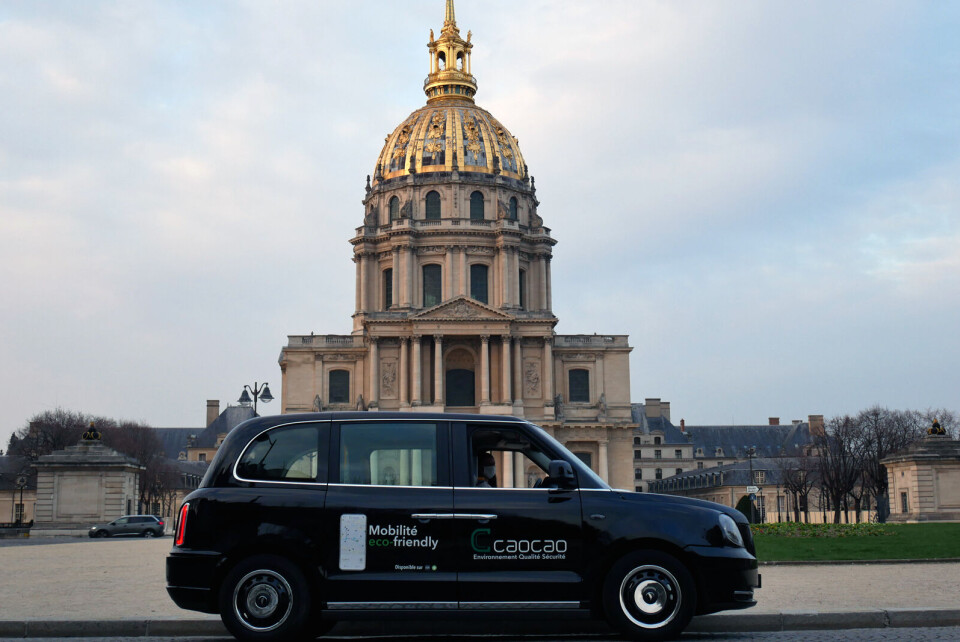-
‘No evidence third party involved’ in deaths of British couple in south-west France
Investigators update The Connexion on Dawn Kerr and Andrew Searle case
-
MPs push to remove low emission zones in France
Critics say the zones penalise lower-income households, but the government has warned abolishing them could cost billions
-
Trump tariffs: Americans in France hit by dollar drop
Europe has said the tariffs will cause the economy to ‘massively suffer’ as France plans retaliation
London cabs set for Paris streets in new ‘exclusive’ transport option
The company behind the scheme, Caocao, is searching for drivers for 300 London cabs set to hit the capital

Up to 300 London taxis are set to take to the streets of Paris as a new ‘exclusive’ transport option.
The vehicles, which have a hybrid petrol and electric motor with rechargeable batteries, will be used as voitures de transport avec chauffeur (VTC) – a category of transport that developed as a way of getting round the strict monopoly enjoyed by licensed taxis in Paris.
'I know it can seem strange to Brits that the London taxi is seen as an exclusive vehicle in France, but it really is ideal for what we want'
Veruschka Becquart, director of development for Caocao, the company behind the scheme says: “They are very easy to get in and out of and well-equipped, with ramps for disabled people if necessary, comfortable seats, panoramic roofs, and a plexiglass screen between the driver and passengers.
“As our main vehicle in what is a crowded VTC offering in Paris, they let us distinguish ourselves from the opposition.”
The taxis are new versions of the LEVC TX model (formerly known as the TX5), made by London EV Company, a subsidiary of Chinese car maker Geely, which also owns Volvo and has a 9% stake in Mercedes Benz owner Daimler.
The cars are built near Coventry. The electric motors provide all the power to the wheels, but when the battery starts to get low, a 1.5 litre, 81hp three-cylinder motor sourced from Volvo takes over to drive a generator.
Caocao, which has a well-established ride-hailing business in China, has recruited 35 drivers on a €1,800 monthly salary to drive the company’s London taxis.
It will divide the rest of the 135-strong fleet between drivers who hire out the cabs and firms who rent the cabs and then provide their own drivers.
“We have another 170 taxis stored and ready to go,” said Ms Becquart, “but the big problem is finding enough drivers – we are recruiting as hard as we can, but it is a tight market, and of course we still lack tourists in Paris.”
Passengers pay a €9.50 minimum fare, with extra costs according to journey length and time spent in traffic jams.
Caocao has also launched a ‘normal’ VTC offering, where drivers provide their own cars, but on the condition they are either electric or hybrid. The minimum fare there is €7.
While in the past there has been tension, sometimes resulting in violence, between VTC and taxi drivers in the capital, in recent times they have united against ride sharing apps such as Uber, which they say do not obey rules.
VTC drivers are required to pass an exam, which can be taken without training by anyone who has had a driving licence for more than three years, and pass a medical.
Criminal offences resulting in six months or more jail for theft, or convictions for fraud or serious driving offences, ban people from being VTC drivers.
They also need a carte professionnelle, delivered by the prefecture, must have professional insurance and drive a car with between four and nine spaces, no older than seven years, and measuring at least 4.5m long and 1.5m wide.
A contrôle technique has to be passed every year.
Cars used as VTCs must usually also have a motor rated at least 84kw (112hp), although size and power rules are relaxed for electric or hybrid electric vehicles.
A round red sticker in the windscreen and another on the back window identify a licensed VTC.
VTC drivers can only pick up passengers who have prebooked at an agreed price, and are not allowed to use taxi ranks or park on the street while waiting for clients.
Related stories
'Transforming Paris’ ring road could help unify the city or divide it'
Empty railway stations in France being revived ‘need ticket offices’
























